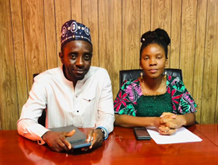
By Lawrence Williams
A pre-legislative hearing of a ‘Safe Motherhood and Reproductive Health Care Bill’ in the small West African nation’s parliament today signals renewed efforts to decriminalise abortion and expand access to reproductive healthcare and family planning services for women and girls throughout Sierra Leone.
The proposed law allows for the termination of a pregnancy during the first three months in cases where there are life-threatening complications that could endanger the life of either the pregnant woman or the child, and pregnancies resulting from rape or incest.
Furthermore, it aims to give women the sole right to decide not only the number and spacing of their children but also whether to keep or terminate a pregnancy.
It states: “A woman shall have the right to determine, on her own behalf, matters relating to family planning, including the number and spacing of her children [and] whether to continue with or terminate a pregnancy.”
The term ‘safe motherhood’ is defined as “initiatives, practices, protocols and service delivery guidelines structured to give mothers high-quality gynaecological, family planning, prenatal, delivery and postpartum care, in order to achieve optimal health for the mother, foetus and infant during pregnancy, childbirth and postpartum”.
Sierra Leone continues to face one of the highest maternal mortality rates in the world, with stillbirths and newborn deaths remaining excessively high, said Dr. Jelikatu Mustapha, deputy minister in the Ministry of Health and Sanitation.
She told lawmakers that teenage pregnancy is a major contributor to maternal deaths, with approximately one in three girls becoming pregnant by the age of 18. She attributed this trend to high rates of unintended pregnancies and limited access to sexual and reproductive health services for women and girls.
She said the country sees an average of 300,000 pregnancies each year, and over 30 percent of these are unintended. More than 60 percent of these unintended pregnancies are terminated, often by untrained and unqualified individuals, leading to severe complications for women and girls.
She said the proposed law was developed after consultation with relevant stakeholders in leadership, governance, and the community.
This new piece of legislation is said to have received the backing of various rights groups, including pro-life activists and the religious community, which obstructed the signing into law of the 2015 Safe Abortion Act.
The bill is scheduled to be piloted tomorrow.


